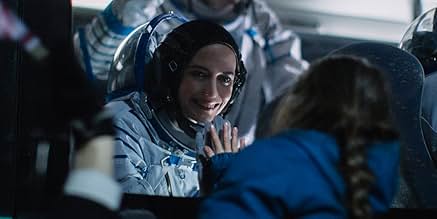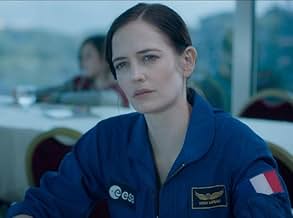Proxima
- 2019
- 1 घं 47 मि
IMDb रेटिंग
6.3/10
9.6 हज़ार
आपकी रेटिंग
अपनी भाषा में प्लॉट जोड़ेंAn astronaut prepares for a one-year mission aboard the International Space Station.An astronaut prepares for a one-year mission aboard the International Space Station.An astronaut prepares for a one-year mission aboard the International Space Station.
- पुरस्कार
- 4 जीत और कुल 7 नामांकन
Zélie Boulant
- Stella Akerman Loreau
- (as Zélie Boulant-Lemesle)
फ़ीचर्ड समीक्षाएं
Written by Alice Winocour and Jean-Stéphane Bron, and directed by Winocour, Proxima is the story of a mother and daughter trying to cope with impending separation. The fact that the mother is an astronaut and that the separation will result from a year-long mission to Mars is very much secondary. Instead, we're presented with something more universal and relatable - the often contradictory responsibilities one has to one's profession and one's family. At the same time, this (unapologetically feminist) film looks at the demands placed on a woman in a male-dominated field where machoism counts for something. More akin to "science fact" films such as The Right Stuff (1983) and First Man (2018) than recent science-fiction work such as Aniara (2018) or Ad Astra (2019), Proxima is a quiet story that maps in great detail the sheer force of will it takes to get into the condition necessary to go space. And although the narrative does sag in a couple of places, and Winocour frustratingly abandons realism in a crucial scene towards the end, Proxima is brilliantly acted throughout. It certainly won't appeal to those looking for the grandiosity or existentialism of classic sci-fi, but it remains a moving examination of motherhood.
In the near future, Sarah Loreau (a superb Eva Green) is a French astronaut based at the European Astronaut Centre (ESC) in Cologne. The only woman in the program, she lives with Stella (a stunning Zélie Boulant), her seven-year-old daughter. Unexpectedly, Sarah is chosen as a replacement for a crew member on the Proxima mission - a year-long three-person final exploratory mission to Mars before colonisation begins. Sarah begins her training at ESC, before travelling to the Yuri Gagarin Cosmonaut Training Centre in Star City, Russia, and finally to the launch site at the Baikonur Cosmodrome in Kazakhstan. Alongside her are mission commander Mike Shannon (an excellent Matt Dillon), an experienced, but smug loudmouth who publically welcomes Sarah to the team by noting that as she's a French woman, she's probably a good cook, and Anton Ocheivsky (Aleksey Fateev), a soft-spoken Ukrainian cosmonaut. At the same time, Sarah is attempting to transition Stella into getting used to living with her father, Thomas (Lars Eidinger), a German astrophysicist from whom Sarah is amicably separated. However, the demands of the job and the concomitant separation put a huge strain on the bond between Sarah and Stella, to the extent that Sarah starts to consider dropping out of the mission altogether.
Proxima is Winocour's third film after Augustine (2012) and the criminally underrated Disorder (2015), both of which deal with intense, highly skilled men who are torn between their professional and private lives, in a similar manner to so many Michael Mann protagonists (and antagonists). With Proxima, however, Winocour moves into uncharted territory - although the protagonist here faces a similar struggle, for the first time, that protagonist is female.
One way Winocour examines the theme of private vs. professional is her use of a recurring motif involving an ESC employee trying to get Sarah to sign papers stating whether or not she wants to be informed should anything happen to Stella. The knee-jerk reaction, of course, is that she should sign them immediately - what kind of person wouldn't want to know if their child was ill or even dead? However, as Winocour presents it, it's more complicated than that; think of Sarah's helplessness - she'd be stuck in space knowing that Stella is dead, but having to complete her assignment anyway. And so Sarah finds her attachment to Stella in conflict with her commitment to the longevity of the mission.
This motif also speaks to the feminist restructuring of a traditionally male narrative. By suggesting that a mother might choose her job over her daughter, even if only for a year, Winocour highlights that whilst it's socially acceptable for men to leave children behind (Mike speaks proudly of his young sons), it's something of a social taboo that women could do so. Another element of the film's feminine (if not necessarily feminist) quality relates to practical biological differences. For example, Sarah is told that tampons count towards her personal weight limit, whilst she has to be moulded for a smaller chair than Mike and Anton.
Aesthetically, the film adopts a realist approach which is almost documentarian in places. Clearly, Winocour and Bron did huge amounts of research, and it helps the sense of authenticity immensely that it was shot on location at the real ESC, Yuri Gagarin Centre, and Baikonur Cosmodrome; in the case of the Yuri Gagarin Centre, Proxima was the first feature film granted access to shoot in the real prophylactorium, with the crew granted the same accreditation as the on-site scientists.
In terms of problems, certainly, if you go into this expecting sci-fi, you're going to be bitterly disappointed. However, the itself makes no bones about the fact that it's the story of a mother and daughter, not a piece of science fiction, and one can only engage with it on its own terms. Another issue is that the narrative does drag in places, and ten minutes or so could have been shaved off the run time. Perhaps the biggest issue I had is that Winocour abandons her rigid adherence to realism for a sequence towards the end of the film which not only strains credibility but is tonally different from everything around it.
Proxima is a small story of a mother and her daughter set against a vast background - the macro is simply the context for the micro. Examining the pain of separation and the clash between the professional and the private from a uniquely feminist point of view, it carries a universal message that will surely speak to any mother who has wrestled with the conflict between pursuing her own dreams and the demands placed on her by having children. However, make no mistake, this is a celebration of the feminine rather than a woke attack on the masculine - men aren't the of the joke or the target of anger, they're simply not very important to the story. A space movie about a woman that takes place entirely on Earth, Proxima is another strong piece of work from a very talented director.
In the near future, Sarah Loreau (a superb Eva Green) is a French astronaut based at the European Astronaut Centre (ESC) in Cologne. The only woman in the program, she lives with Stella (a stunning Zélie Boulant), her seven-year-old daughter. Unexpectedly, Sarah is chosen as a replacement for a crew member on the Proxima mission - a year-long three-person final exploratory mission to Mars before colonisation begins. Sarah begins her training at ESC, before travelling to the Yuri Gagarin Cosmonaut Training Centre in Star City, Russia, and finally to the launch site at the Baikonur Cosmodrome in Kazakhstan. Alongside her are mission commander Mike Shannon (an excellent Matt Dillon), an experienced, but smug loudmouth who publically welcomes Sarah to the team by noting that as she's a French woman, she's probably a good cook, and Anton Ocheivsky (Aleksey Fateev), a soft-spoken Ukrainian cosmonaut. At the same time, Sarah is attempting to transition Stella into getting used to living with her father, Thomas (Lars Eidinger), a German astrophysicist from whom Sarah is amicably separated. However, the demands of the job and the concomitant separation put a huge strain on the bond between Sarah and Stella, to the extent that Sarah starts to consider dropping out of the mission altogether.
Proxima is Winocour's third film after Augustine (2012) and the criminally underrated Disorder (2015), both of which deal with intense, highly skilled men who are torn between their professional and private lives, in a similar manner to so many Michael Mann protagonists (and antagonists). With Proxima, however, Winocour moves into uncharted territory - although the protagonist here faces a similar struggle, for the first time, that protagonist is female.
One way Winocour examines the theme of private vs. professional is her use of a recurring motif involving an ESC employee trying to get Sarah to sign papers stating whether or not she wants to be informed should anything happen to Stella. The knee-jerk reaction, of course, is that she should sign them immediately - what kind of person wouldn't want to know if their child was ill or even dead? However, as Winocour presents it, it's more complicated than that; think of Sarah's helplessness - she'd be stuck in space knowing that Stella is dead, but having to complete her assignment anyway. And so Sarah finds her attachment to Stella in conflict with her commitment to the longevity of the mission.
This motif also speaks to the feminist restructuring of a traditionally male narrative. By suggesting that a mother might choose her job over her daughter, even if only for a year, Winocour highlights that whilst it's socially acceptable for men to leave children behind (Mike speaks proudly of his young sons), it's something of a social taboo that women could do so. Another element of the film's feminine (if not necessarily feminist) quality relates to practical biological differences. For example, Sarah is told that tampons count towards her personal weight limit, whilst she has to be moulded for a smaller chair than Mike and Anton.
Aesthetically, the film adopts a realist approach which is almost documentarian in places. Clearly, Winocour and Bron did huge amounts of research, and it helps the sense of authenticity immensely that it was shot on location at the real ESC, Yuri Gagarin Centre, and Baikonur Cosmodrome; in the case of the Yuri Gagarin Centre, Proxima was the first feature film granted access to shoot in the real prophylactorium, with the crew granted the same accreditation as the on-site scientists.
In terms of problems, certainly, if you go into this expecting sci-fi, you're going to be bitterly disappointed. However, the itself makes no bones about the fact that it's the story of a mother and daughter, not a piece of science fiction, and one can only engage with it on its own terms. Another issue is that the narrative does drag in places, and ten minutes or so could have been shaved off the run time. Perhaps the biggest issue I had is that Winocour abandons her rigid adherence to realism for a sequence towards the end of the film which not only strains credibility but is tonally different from everything around it.
Proxima is a small story of a mother and her daughter set against a vast background - the macro is simply the context for the micro. Examining the pain of separation and the clash between the professional and the private from a uniquely feminist point of view, it carries a universal message that will surely speak to any mother who has wrestled with the conflict between pursuing her own dreams and the demands placed on her by having children. However, make no mistake, this is a celebration of the feminine rather than a woke attack on the masculine - men aren't the of the joke or the target of anger, they're simply not very important to the story. A space movie about a woman that takes place entirely on Earth, Proxima is another strong piece of work from a very talented director.
The subject is a European Space Agency mission called Proxima, astronauts will travel from the Russian launch site to the space station and stay there living and working for a year. The prime subject of the movie is the single French mom who has an eight year old daughter. Being separated for that long will be difficult for both of them.
This is not a space action movie, in fact it ends with the blast off. It is a character study, surely inspired by the many mothers who have done something similar over the past 35 to 40 years. During the end credits are a montage of several female astronauts and their families, from a variety of countries.
This is a good movie, my wife and I enjoyed it at home on DVD from our public library.
This is not a space action movie, in fact it ends with the blast off. It is a character study, surely inspired by the many mothers who have done something similar over the past 35 to 40 years. During the end credits are a montage of several female astronauts and their families, from a variety of countries.
This is a good movie, my wife and I enjoyed it at home on DVD from our public library.
It isn't a question of how flashy the sci fi is, it is a question of how interesting and challenge it is. Proxima is neither. In fact it is so didactic as to be insulting to the audience and seems to assume the audience are dullards that need repetition.
Sarah (Eva Green) is given the chance of a lifetime to go to the International Space Station for a year. The trouble is it means leaving her beloved daughter Stella (Zélie Boulant-Lemesle). The film charts her exhausting and often restrictive training whilst she tries to cope with leaving her daughter and trying to do and say the right things.
This is actually quite a simple tale, told and acted well about the relationship between mother and young daughter when pressures threaten to pull them apart. Green in excellent struggling between the two most important things in her life, whilst young Boulant-Lemesle is extremely impressive as Stella. Care, this is a straight sometimes moving drama. It is not an adventure or a sci-fi film, you've been warned, although the training is interesting.
This is actually quite a simple tale, told and acted well about the relationship between mother and young daughter when pressures threaten to pull them apart. Green in excellent struggling between the two most important things in her life, whilst young Boulant-Lemesle is extremely impressive as Stella. Care, this is a straight sometimes moving drama. It is not an adventure or a sci-fi film, you've been warned, although the training is interesting.
As European cinema is not about special effects and love stories with explosions on the background, but rather about things that are real, common and confronting, this movie is anything but a disappointment if you are familiar with the style.
If you like a good book, this is a film you should watch. It's about the little things of personal interaction. About sharing precious moments, or breaking promises. ("love vs struggle")
This movie makes you reflect on yourself, as you will not always understand why your main character does what she does. How she is capable of leaving Earth being a mother.
I have read reviews about the movie being full with stereotypes and cliché's. I think the truth is quite the opposite. Russians seem to be the friendliest and most supportive people in the world. An ex-husband who is (on a distance) emotionally involved in her life. An American ex-soldier actually reciting poetry, and children acting like children.
If you rate this low, you are simply not on their level!
If you like a good book, this is a film you should watch. It's about the little things of personal interaction. About sharing precious moments, or breaking promises. ("love vs struggle")
This movie makes you reflect on yourself, as you will not always understand why your main character does what she does. How she is capable of leaving Earth being a mother.
I have read reviews about the movie being full with stereotypes and cliché's. I think the truth is quite the opposite. Russians seem to be the friendliest and most supportive people in the world. An ex-husband who is (on a distance) emotionally involved in her life. An American ex-soldier actually reciting poetry, and children acting like children.
If you rate this low, you are simply not on their level!
क्या आपको पता है
- गूफ़When Sarah seals an envelope for her daughter Stella and writes her daughter's name on the envelope., she does not cross the 't' in Stella's name.
- क्रेज़ी क्रेडिटInterspersed through the end credits are images of various female astronauts with their children.
- कनेक्शनFeatures Voyna i mir (1965)
- साउंडट्रैकPoblijei (Closer}
Written and performed by Luba Hilman
टॉप पसंद
रेटिंग देने के लिए साइन-इन करें और वैयक्तिकृत सुझावों के लिए वॉचलिस्ट करें
विवरण
- रिलीज़ की तारीख़
- कंट्री ऑफ़ ओरिजिन
- आधिकारिक साइटें
- भाषाएं
- इस रूप में भी जाना जाता है
- Проксима
- फ़िल्माने की जगहें
- Star City, Zvyozdny gorodok, Moscow Oblast, रूस(Russian training center)
- उत्पादन कंपनियां
- IMDbPro पर और कंपनी क्रेडिट देखें
बॉक्स ऑफ़िस
- बजट
- €64,00,000(अनुमानित)
- दुनिया भर में सकल
- $7,59,397
- चलने की अवधि1 घंटा 47 मिनट
- रंग
- पक्ष अनुपात
- 1.85 : 1
इस पेज में योगदान दें
किसी बदलाव का सुझाव दें या अनुपलब्ध कॉन्टेंट जोड़ें



![Trailer [English SUB]](https://m.media-amazon.com/images/M/MV5BNmU1MjRiYTAtZGE1Yi00MTYxLTk5NWUtMTQ4MDhhZTlhYjA0XkEyXkFqcGdeQXRyYW5zY29kZS13b3JrZmxvdw@@._V1_QL75_UY281_CR11)




























